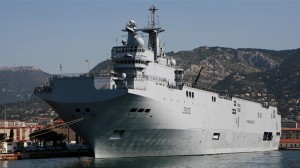
If Russia purchased the Mistral class assault ship from France, the Baltic state's old nemesis would see its amphibious attack capabilities significantly increased.
RIGA — Fear and confusion is the reaction in the Baltic states to Russia’s stated wish to buy a state-of-the-art Mistral class amphibious assault ship from France.
Designed for deploying helicopters, tanks and troops, the ship was developed in France for the French Navy and is considered state-of-the-art.
Recent military exercises and a change in Russia’s military doctrine have led to wild speculations about Russia’s current strategic course. Also, the “humanitarian dimension” of Russia’s foreign policy, Moscow’s main tool for its soft-power strategy, feeds fears that Russian passports could be offered to stateless persons in the Baltic states.
The United States has repeatedly assured the eastern members of NATO that the lone superpower takes its commitments to the alliance’s Article 5 commitments very seriously and that no real security threat from Russia exists.
“There is no country in the European Union or NATO that is critically vulnerable to a threat or influence from a country outside” said U.S. State Department’s Deputy Assistant Secretary Pamela Quanrud during her recent trip to Latvia. U.S. Vice President Joe Biden made similar comments in a recent speech to NATO members in Bucharest.
But the Baltic governments and political analysts are not so sure, and the potential purchase of the assault ship has only engorged latent fears of Russian aggression.
As reported in the Estonian media, Commander-in-Chief of the Estonian Defense Forces Ants Laaneots recently stated that “measures should be taken to ensure Estonian national security” in case Russia buys the Mistral class vessel.
Meanwhile a Latvian defense ministry official said recently that Russia’s aims are being observed with caution and that the Baltic states will held joint consultations to seek common ground on how to proceed. Lithuanian President Dalia Grybauskaitė said NATO must draft a new defense plan for the Baltic states.
There’s confusion in the Baltics as to why fellow NATO member France would agree to sell such a weapon to Russia, given the eastern members worry about their security.
“NATO does not seem prepared … to treat the Mistral affair as an issue for the Alliance,” Vladimir Socor, an analyst at the Jamestown Foundation, an independent, non-partisan research institution, told Baltic Reports. “The U.S. is not being heard from either.”
It is still unclear what France actually intends to go through with the sale or not. According to the same official, the Latvian Ministry of Defense has not received any information on this issue from France and would like to receive clarification on this issue.
Increased Russian capabilities
Russia’s military is a shadow of the strength of its Soviet incarnation. The Mistral carrier would give Russia’s navy the capability to perform amphibious assaults, withdrawals, and raids and allow the transport and deployment of a force made up of four combat companies — including some 16 helicopters, four landing barges, up to 70 vehicles or a 40-piece strong tank battalion as well as an additional 450 troops. The vessel also has a 69-bed hospital.
During the Georgian-Russian War one year ago, Russia needed more then two days to regain power over the rebellious regions of South Ossetia and Abkahzia. Seaborne airlift capacities would have shortened combat time, according to statements by Russian military officials.
If the Mistral vessel would be in Russia’s hand, it could be easily deployed for an intimidating effect on Russia’s maritime neighbors in the Black Sea, Baltic Sea, or elsewhere. Together with Russia’s new military doctrine — allowing Russia preventive military operations against other countries to protect its citizens — this is a major shift for the current force projection in the Baltic Sea region.
Russia’s government has not publicly announced whether it will purchase the expensive carrier. Russian officials suggested that Moscow is not rushing to sign the contract.
— Baltic Reports editor Nathan Greenhalgh contributed to this article.













“There’s confusion in the Baltics as to why fellow NATO member France would agree to sell such a weapon to Russia.”
loads of money is one possible reason, perhaps?
But its true that OTAN countries should really only sell their spare weapons to level-headed, rational folk like Saakashvili and nice democratic countries like Saudi Arabia.
“Russian passports could be offered to stateless persons in the Baltic states.”
Well, the solution to that is obvious and should have been dealt with years ago!